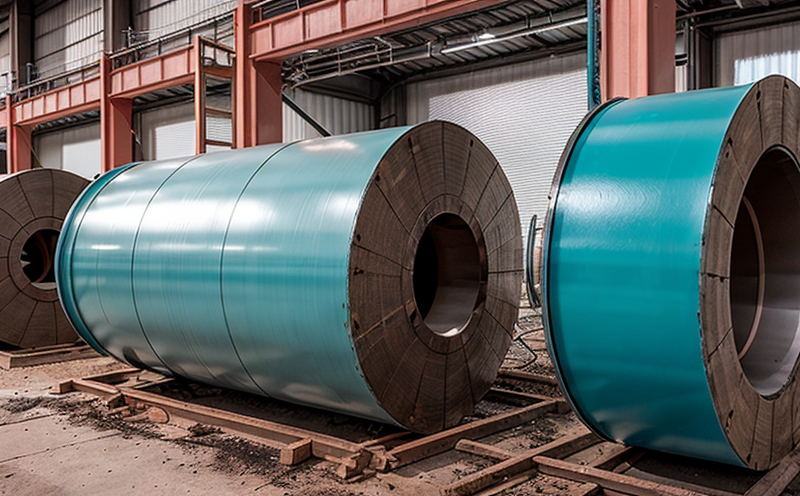ASTM G85 Modified Salt Fog Corrosion Testing Validation Method Development Test
The ASTM G85 modified salt fog corrosion testing validation method development test is a critical process used to evaluate the resistance of materials, coatings, and components to atmospheric exposure. This test is particularly valuable in industrial manufacturing and processing sectors where durability under harsh environmental conditions is paramount.
The ASTM G85 protocol involves exposing specimens to a controlled environment that simulates salt fog. This test helps manufacturers ensure their products meet the necessary quality standards for long-term performance, especially in industries prone to atmospheric corrosion such as aerospace, automotive, marine, and construction. The test results provide valuable insights into material behavior under specific environmental conditions.
The modified protocol of ASTM G85 is essential for validating new testing methods or refining existing ones. It ensures that the test methodology aligns with international standards, thereby enhancing reliability and consistency in quality assurance processes.
To achieve accurate and reliable results, specimens must be prepared according to strict guidelines. This includes cleaning, degreasing, and applying relevant coatings if necessary. The test environment must also meet stringent criteria to ensure consistent exposure levels. Understanding the nuances of this process is crucial for achieving valid validation outcomes.
The testing procedure itself involves exposing the specimen to a controlled salt fog environment for an extended period. During this time, the performance of the material or coating is monitored closely. Specimens are typically assessed visually and through other non-destructive means such as weight loss measurements.
Post-test analysis plays a vital role in interpreting results accurately. This includes detailed examination of any corrosion that has occurred on the surface of the specimen. The depth, extent, and type of corrosion are documented meticulously to provide comprehensive insights into material performance.
The ASTM G85 modified salt fog test is not only useful for validating new methods but also serves as a benchmark for comparing different materials or coatings under similar conditions. This facilitates informed decision-making in product development and quality assurance processes within the industrial sector.
Understanding how to interpret these results accurately can significantly impact business decisions related to material selection, process improvements, and overall product reliability. By leveraging this knowledge effectively, companies can enhance their competitive edge by ensuring higher-quality products that meet stringent environmental requirements.
| Specimen Preparation | Environment Criteria | Monitoring Parameters | Evaluation Metrics |
|---|---|---|---|
| Cleaning and Degreasing | Humidity, pH Levels | Weight Loss Measurements | Visual Inspection |
| Coating Application (if necessary) | Temperature Control | Corrosion Depth Assessment | Non-Destructive Testing |
- Ensures compliance with international standards.
- Provides detailed insights into material performance under specific conditions.
- Supports the validation of new testing methods or refinements to existing ones.
- Aids in informed decision-making regarding product development and quality assurance processes.
- Extensive experience with ASTM G85 protocol.
- Dedicated team specializing in corrosion resistance evaluation.
- State-of-the-art facilities for controlled environmental testing.
- Pioneering research capabilities for developing novel validation methods.
Industry Applications
The ASTM G85 modified salt fog corrosion testing method finds extensive application across various industries. Primarily used in sectors like aerospace, automotive, marine, and construction, this test ensures that materials and coatings perform reliably under harsh environmental conditions.
- Aerospace: Evaluating the durability of components exposed to salt-laden environments during aircraft operations.
- Automotive: Assessing the performance of vehicle parts subjected to road salt and other corrosive elements.
- Marine: Testing materials used in shipbuilding and offshore structures against marine corrosion.
- Construction: Ensuring that building materials withstand exposure to salty air and moisture.
| Industry Sector | Main Application | Specific Challenge Addressed |
|---|---|---|
| Aerospace | Evaluating the durability of components exposed to salt-laden environments. | Ensuring reliability in harsh atmospheric conditions. |
| Automotive | Assessing the performance of vehicle parts subjected to road salt and other corrosive elements. | Maintaining quality standards for durable automotive components. |
| Marine | Testing materials used in shipbuilding and offshore structures against marine corrosion. | Guaranteeing long-lasting performance of maritime infrastructure. |
| Construction | Ensuring that building materials withstand exposure to salty air and moisture. | Achieving sustainable construction practices with durable materials. |
Eurolab Advantages
At Eurolab, we offer unparalleled expertise in ASTM G85 modified salt fog corrosion testing validation method development. Our comprehensive approach ensures that our clients receive accurate and reliable results every time.
- Experienced Team: Our dedicated team specializes in corrosion resistance evaluation, bringing years of experience to each project.
- State-of-the-Art Facilities: Equipped with cutting-edge facilities for controlled environmental testing, we provide precise and consistent results.
- Pioneering Research: Leveraging our pioneering research capabilities, we contribute significantly to the development of novel validation methods.
- Compliance Expertise: Ensuring that all tests meet international standards and regulations is a core part of what we do.
- Years of experience in ASTM G85 testing protocols.
- Detailed understanding of industry-specific challenges.
- Access to advanced equipment for precise measurements.
- Continuous improvement through ongoing research and development.
Quality and Reliability Assurance
The ASTM G85 modified salt fog corrosion testing method is integral to quality assurance programs, helping to ensure that products meet stringent environmental requirements. This test plays a crucial role in validating new materials or coatings for their durability under specific conditions.
- Non-Destructive Testing: Utilizing advanced techniques like weight loss measurements and visual inspection ensures minimal impact on the specimen while providing accurate data.
- Data Interpretation: Our team of experts is adept at interpreting results to identify areas for improvement, ensuring that products perform optimally in real-world scenarios.
- Accurate and consistent test results across multiple environments.
- Comprehensive analysis supporting informed decision-making processes.
- Supportive of sustainable development practices through reliable product performance data.
- Compliance with international standards enhancing global market acceptance.





